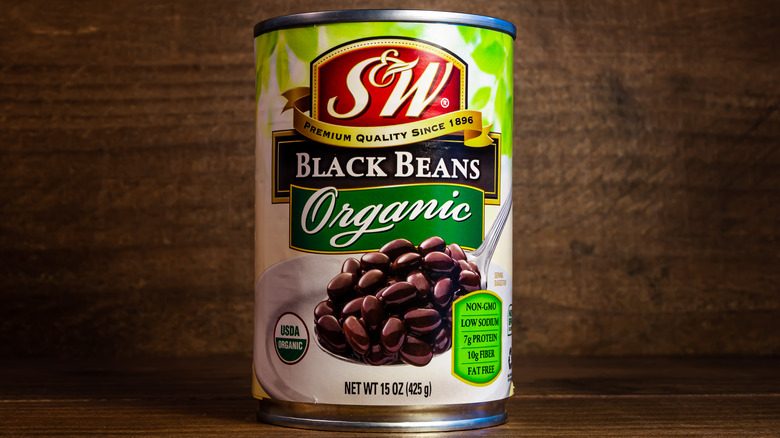The Most Recent Black Bean Recall Was Just Massively Expanded. Here's What You Need To Know
If you love incorporating black beans into your weekly meal plan, you may have already heard about the current recall on this product. According to Delish, Faribault Foods, Inc. issued a voluntary recall of their black beans back in April, due to an issue with the cans' hermetic seal that caused a widespread botulism contamination. Astute Redditors also noticed that Costco prominently featured this brand of black beans, causing many to take note of their pantry items and return any damaged goods. While it seemed like this situation started to near its natural conclusion, a new wave of contaminations have appeared on the market, sparking further recalls.
As posted by the FDA, Faribault Foods, Inc. has expanded their voluntary recall to include 15-ounce cans of S&W Organic Black Beans, 15-ounce cans of O Organic Brand Black Beans, and 15-ounce cans of O Organic Brand Chili Beans due to hermetic seal failures. Affected products appear bloated or may leak, indicating bacterial exposure resulting in botulism contamination. The damaged goods have shipped out to California, Washington, Utah, Oregon, Arizona, Colorado, Alaska, Hawaii, Texas, Georgia, and Idaho, and appear in a variety of grocery stores.
How to tell if you have unsafe beans
You can check lot codes and expiration dates on your beans to see if you own any contaminated products, and make sure to check the FDA website to see the extensive list of codes and dates. Anyone with affected products can return the cans to their point of purchase for either a refund or a new can of beans. For questions, you can also call 1-888-201-6440 between Monday and Friday between 8 a.m. and 5 p.m. CST to talk to a company representative. According to Delish, the tainted beans hit markets between August 2020 and April 2021, meaning that you potentially have stocked up on this bean if you usually buy Faribault Foods, Inc. products.
Make sure to properly dispose of the affected black beans if you come across any in your pantry. You wouldn't want to risk getting ill over a can of these staples and can guarantee to stock up on a few more when you return them to your local store. With a bit of vigilance, you can avoid any botulism risk and end up with some safe, new ingredients perfect for any recipe.

